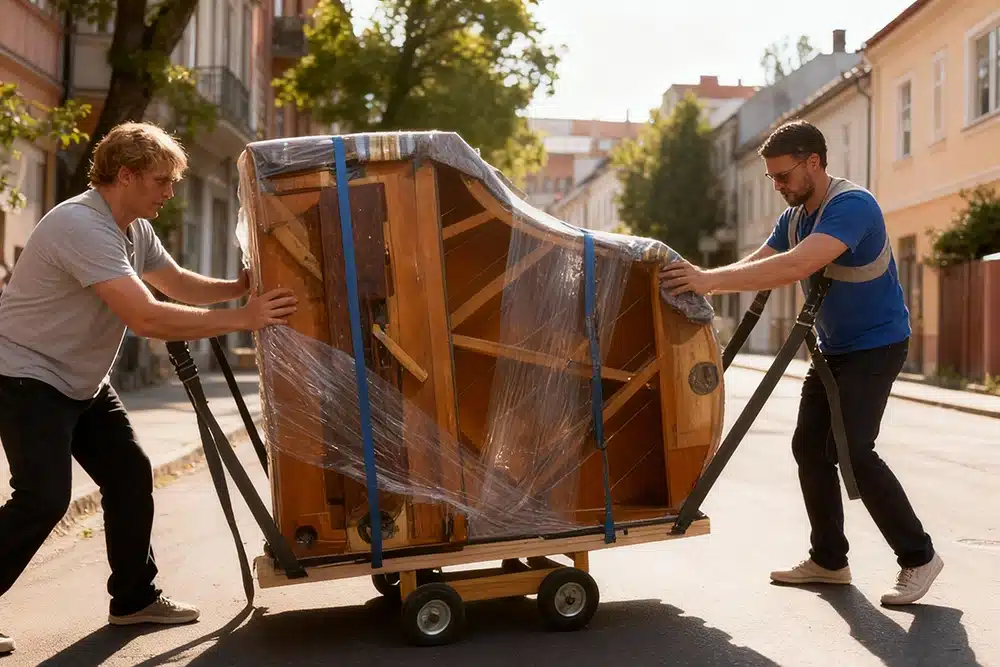Maintaining the right climate for your piano is crucial, especially during a move. Pianos are sensitive to changes in temperature and humidity, which can affect their sound and structure. Understanding the importance of climate control helps us keep our pianos in top condition, whether they’re in our living rooms or being transported across the country.
Understanding the Importance of Climate Control for Pianos
Climate control is vital for maintaining a piano’s health and performance. Pianos are primarily made of wood, which naturally expands and contracts with changes in temperature and humidity. When the climate isn’t controlled, these fluctuations can cause significant damage. For instance, sudden temperature changes can lead to wood cracking, while excessive humidity or dryness can affect the soundboard, leading to tonal issues.
Moreover, the metal components inside a piano, like strings and pins, are also sensitive to climate changes. High humidity can cause rust, affecting the tuning stability and sound quality. On the other hand, low humidity can make the felt parts inside the piano become brittle and less effective. Keeping the piano in a controlled environment ensures it stays in tune longer and sounds better.
Understanding this helps us see why moving a piano without considering climate control can be risky. A consistent environment helps preserve the structure and sound quality of the piano, making climate control essential for any move.
Common Climate-Related Risks During Transportation
During transportation, pianos are exposed to different climates, which can pose several risks. One major risk is temperature fluctuation. Moving through hot areas into cooler regions can cause the wood parts to expand and contract rapidly. This can result in cracks or warping, compromising the piano’s structural integrity.
Humidity fluctuations are another concern. High humidity levels can lead to the absorption of moisture by the piano’s wooden parts, causing them to swell. This can affect the keys and the soundboard, potentially leading to costly repairs. Conversely, low humidity can dry out the wood and felt components, making them brittle and more prone to damage.
Additionally, exposure to these varying conditions can affect the tuning stability. As the piano adjusts to new climates, tensions in the strings can shift, leading to detuning. Regular climate control helps prevent these risks, ensuring the piano remains in good condition throughout the move. Understanding these common risks highlights the importance of implementing effective climate control strategies during transportation.
How to Implement Effective Climate Control in Piano Moving
Implementing effective climate control during piano moves involves several steps. First, we need to use a climate-controlled moving truck. These trucks maintain a consistent temperature and humidity level, preventing rapid changes that can harm the piano. Choosing a reputable moving company that offers these specialized trucks is important.
Another crucial step is proper packing. Wrapping the piano in thermal blankets helps regulate its temperature during the move. These blankets provide an extra layer of insulation, shielding the piano from external temperature swings. Additionally, we use moisture-absorbing materials inside the packing to manage humidity levels.
Monitoring the climate conditions during the move is also essential. We can use portable climate monitors to check the temperature and humidity inside the truck. If these levels vary, adjustments can be made promptly to prevent damage. By implementing these measures, we ensure that the piano is transported in a stable environment, minimizing the risk of climatic damage.
Best Practices for Maintaining Piano Health in Varying Climates
Maintaining piano health in varying climates requires ongoing care. Even after moving, it’s essential to keep the piano in a room with stable temperature and humidity. Ideally, pianos should be kept in a room with a temperature between 68°F and 72°F and humidity levels around 42%. Using a room humidifier or dehumidifier helps maintain these ideal conditions.
Placing the piano away from direct sunlight and heating vents helps preserve its condition. Sunlight can cause the piano’s finish to fade and its parts to dry out. Heating vents can lead to rapid temperature changes, affecting the wood and metal components.
Regular maintenance is another key practice. Scheduling professional tunings and inspections at least twice a year helps keep the piano in optimal condition. Professionals can identify any climate-related damage early and make necessary repairs. By following these best practices, we ensure our pianos continue to perform beautifully, regardless of the climate.
Move Your Piano Safely with Piano Movers of Houston
Managing the climate for your piano both during moves and at home is crucial to its longevity and performance. From understanding the importance of climate control and recognizing common climate-related risks to implementing effective measures and maintaining proper conditions, these steps help protect your piano. Ensuring stable conditions prevents damage and maintains the piano’s sound quality.
When moving your cherished instrument, trust Piano Movers of Houston. We specialize in offering climate-controlled moves to safeguard your piano against temperature and humidity changes. Reach out to us for a professional, careful, and experienced approach to moving your piano. Let us handle your piano with the utmost care, ensuring it arrives at its new home in perfect condition. Contact our piano mover in Houston today to learn more about our services and how we can help you.
Related Posts

The Hidden Risks When General Movers Handle a Piano Move (And How Professional Movers Mitigate Them)

Why Choose Specialized Piano Movers vs General Movers
